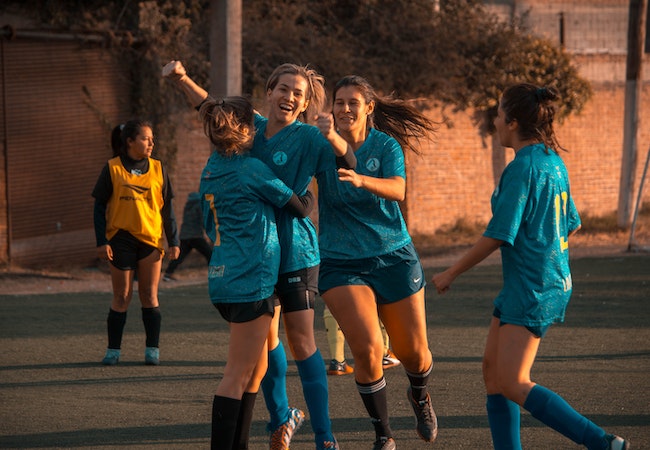6 Tips For A Healthy Life Style For Interscholastic Athletes

If you are an interscholastic athlete and want to be a top player, then you need to spend time on your health, because the more healthy lifestyles you have the better you will be at your sport. There is a wide range of difficulties that interscholastic athletes may face at a number of levels. The athletic competition involves high physical, emotional and cognitive stressors which are continuous or multiple and recurrent over a prolonged period in order to advance to national and international levels. Sports can be extremely demanding on the body, especially for the untrained athlete.
So, it is time to get serious and seek the 6 tips for a healthy lifestyle for school athletes. Now, after I hear the word athlete I just realized that girls will be looking at you and admire you. That is what interferes with school work but that is not our problem here. Just imagine yourself having health problems in the future. The best thing you can do right now is to start taking care of yourself now before it gets worse.
Before discussing this further let me tell you that if you want to incorporate some workouts into your exercise routine make sure you are wearing the right gym outfits because your workout clothes have to do a lot with your performance.
Healthy Lifestyle For Interscholastic Athletes
Adopt Healthy Eating Habits
Eat breakfast every day because breakfast is the most important meal of the day especially if you’re an athlete. Studies show that eating breakfast helps control your weight and reduces cravings later in the day. It’s also important because it gives your body fuel so it can perform at its best during practice and games.
Similarly, athletes who eat a balanced diet are less likely to get sick during the sports season, and their bodies will be able to handle all of the physical demands of their sport more easily. Eating a balanced diet means eating foods from every food group fruits, vegetables, grains, and protein sources as well as drinking plenty of water. Foods that are high in carbohydrates will help give you energy, while protein is important for repairing muscle tissue after a workout.
A balanced diet also means eating healthy fats, such as omega-3 fatty acids found in fish and flax seeds. It’s also important to eat enough calories each day. For most athletes, this means eating between 1,200 and 2,000 calories per day — depending on your age and gender. If you’re trying to gain weight or build muscle, you may need to eat more than 2,000 calories per day. If your goal is to lose weight, however, you should eat fewer calories each day. You can also get all of the nutrients you need by eating a variety of different foods. For example, if you eat meat and vegetables every day, you’ll likely get enough protein for your body.
Also, you need to avoid eating junk food because it will make your stomach hurt and make it difficult for you to play well. Cut back on foods high in solid fats such as cookies, cakes, pie crusts, and doughnuts. They are high in calories with little nutritional value besides fat (and sometimes sugar).
Eat Before a Game or Practice
Eating before the sports helps in keeping your energy up throughout the game or practice session. Some athletes prefer small snacks that can be eaten easily on the field or court, while others prefer larger meals that take longer to digest so they don’t feel hungry during the game or practice session. If you’re going to eat something solid before your game or practice session, make sure it’s something light like fruit or yogurt rather than something heavy like cheeseburgers or pasta salad.
Also, try to avoid eating too close to the time you want to play your game or practice. This will give your body enough time for digestion and absorption of nutrients before you start playing sports.
Get Plenty Of Sleep
It’s hard to perform well on the field if you’re exhausted. Make sure that you get plenty of sleep each night before a game or practice session so that you wake up feeling refreshed and ready for action. It’s not just about the physical aspects of your game, because if you want to be a star athlete, you need to take care of your body both on and off the field.
Make Time For Exercise
Exercise doesn’t have to be complicated or time-consuming. Try walking or running during lunch or before school; stretching after practice; or doing push-ups and sit-ups before bedtime. You can also try yoga or Pilates classes at your local gym or recreation center because many of these classes are designed specifically for teens who want to stay fit without sacrificing their social lives. Besides that, make sure to wear lightweight and stretchable athletic
wear, so that your workout should be fun and more productive.
Drink Plenty of Fluids During Exercise Sessions
You don’t want dehydration affecting your performance during an important game or tournament. Drinking plenty of fluids before, during, and after exercise sessions is one way to help keep yourself hydrated. You can also use the color of your urine as a quick and easy indicator of how well-hydrated you are.
If it’s light yellow or clear, then you are adequately hydrated.
Manage Your Stress and Anxiety
Stress has many negative effects on athletes as well as non-athletes alike. It is common for athletes to experience physical symptoms such as headaches, stomachaches, or muscle aches when they are under stress. These symptoms may be related to an increase in cortisol levels in the body or an adrenaline rush that occurs during periods of high-intensity competition or training sessions. When these symptoms occur during practice or competition they can affect performance negatively by causing fatigue or distraction which may lead to injury or poor performance on the field/court/rink/etc.
It is also common for athletes to experience psychological symptoms such as anxiety, depression, and irritability when they are under stress.
So, in order to stay away from stress, you need to try meditation to help you relax your body and mind. Moreover, find ways to manage stress and anxiety, by practicing breathing exercises or meditation techniques.



